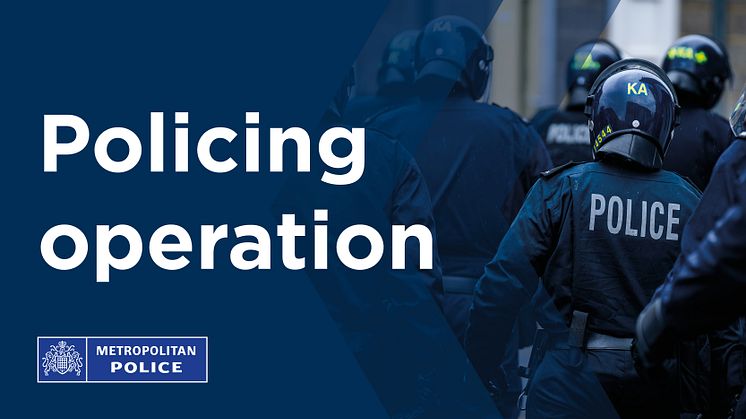
News -
Met police urge Londoners and night-time venues to report suspected spiking
People who visit clubs and bars in London are being urged to look out for the signs of spiking and report cases to police, as the Met steps up efforts to make London safer.
The call comes as part of the Met’s commitment to protect the public from harm and support victims of crime.
The Met has been working to tackle spiking by working closely with expert charities, including Stamp Out Spiking and Drinkaware, as well as bars and clubs across the capital.
The Met are also partnered with London’s Safer Business Network, training over 850 venues between 2023-2024. The training helps staff to spot predatory behaviour and know what to do if customers tell them they or their friend has been spiked.
In one recent case in central London, the venue’s quick detection of a drink suspected of being tampered with led to the arrest of the alleged suspect. Building on training received by Met officers, staff knew to cover the victim’s drink and alert police straight away. A man has been charged with offences in relation to this matter.
Spiking is a complex offence to investigate and there is often limited evidence to identify offenders, which is why early reporting and testing is key. Officers and staff are using early evidence kits, which allow them to quickly identify whether a person has been spiked. This information also supports officers to develop their own intelligence on spiking substances and identify hotspot areas.
In data shared by the Met today (Saturday 11 May), an average of 60% of spiking cases took place in licensed venues. 65% of reports took place between 6pm and 6am.
60% of reported cases were from women and 40% men, with Westminster having the highest reports.
With the popularity of vaping on the rise, officers have also shared concerns about people sharing vapes. This comes after seeing an increase in illegal drugs in vapes over recent times, with some reports of vapes being spiked.
Detective Chief Superintendent Angela Craggs, from the Met’s Public Protection team, said: “Anyone enjoying a night out in London deserves to be safe and we’re determined to do everything we can protect the people from harm.
“Spiking is a premediated and invasive crime and we are doing more to target predatory and dangerous offenders.
“We cannot tackle spiking alone and that’s why we’re working closely with charities, venues and businesses across London and beyond – training nightclub staff to spot the signs of spiking and helping to raise awareness with those who visit pubs and clubs.
“Our message to victims is clear – please come forward and get the support you rightly deserve from our specially trained officers.”
Senior officers in the Met recently held a roundtable, bringing together charities and businesses to show how they are working together to prevent spiking in the night-time industry and better support victims.
This included guest speakers -
- Karen Tyrell, CEO of Drinkaware;
- Dawn Dines, CEO of Stamp Out Spiking;
- Mark McEvoy, Managing Director of major night club chain Tiger Tiger;
- Eren Bessim, Training and Development Manager from Safer Business Network.
Karen Tyrell, CEO of the charity Drinkaware said: "Drink spiking is a serious crime that can happen to anyone at any time. Our research shows that men are as likely to be victims as women.
“Ensuring public spaces are safe is a collective responsibility, including the police and venues, not one that should only be placed on the potential victims, so it is heartening to see different sectors coming together to collaborate more effectively.
“It is important that everyone knows what to do and reports of spiking are taken seriously. If you are worried, you can find out more on our website, Drink spiking and date rape drugs | Drinkaware”
Victims visiting the Drinkaware website will now be signposted to the Met to anonymous reports.
Victims can report a recent or non-recent case of spiking here - How to report spiking to the police | Metropolitan Police
Dawn Dines, CEO and founder of charity Stamp Out Spiking said: “After so many years of campaigning, Stamp Out Spiking are delighted to announce how we are working with various partners across the Night-time Industries led by the Metropolitan Police.
“Working collaboratively to educate and protect on all spiking related issues is going to give us the opportunity to safeguard and intercept perpetrators before these invisible crimes start affecting our communities.
“Please download free links here https://stampoutspiking.org/resources-products/ for resources and contact our national charity at www.stampoutspiking.org for any further information. Links to training can be found here https://stampoutspiking.org/training/ .”
If you think you or a friend have been spiked there are a number of things to look out for including -
- confusion,
- nausea/vomiting,
- hallucinations and paranoia,
- disorientation,
- poor coordination, and
- unconsciousness.
If you think you or your friends have been spiked, alert a member of staff or security and in an emergency call 999.
Anyone who is a victim of spiking or knows someone that has been should report it to police
straightaway to give the best chances of capturing evidential opportunities and helping us learn more about how perpetrators operate.
